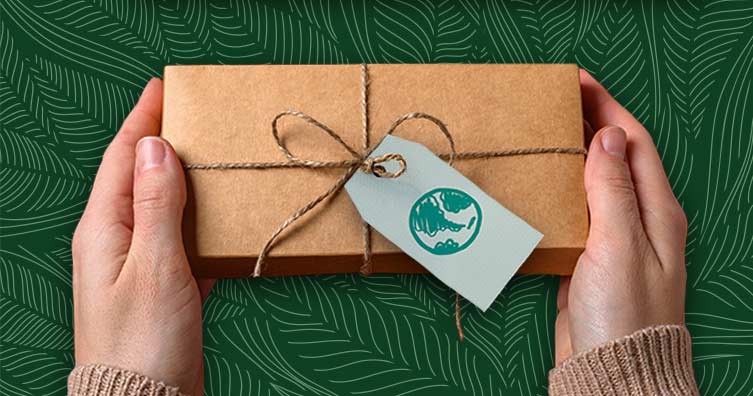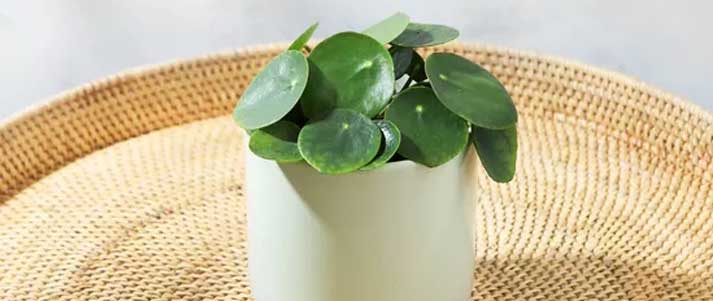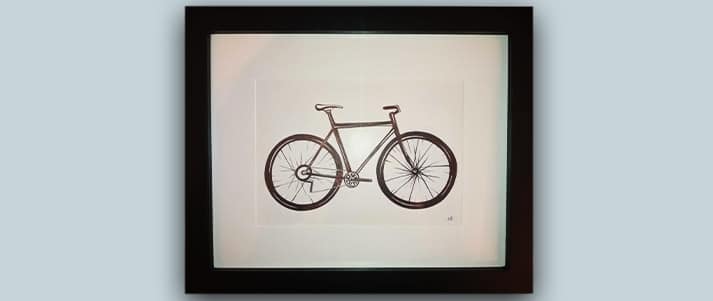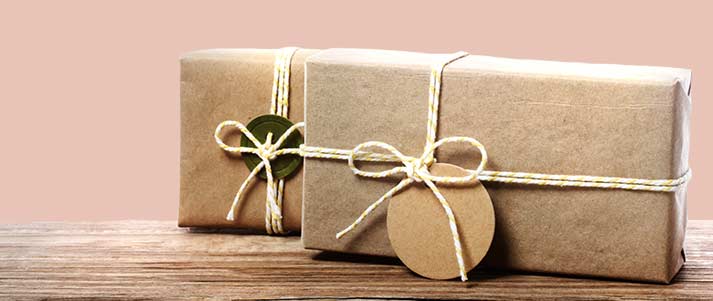20 best eco-friendly gift ideas 2024
A gift that's thoughtful, affordable and kind to the planet is hard to beat. To help you find the perfect sustainable present, we've put together a list of the top eco-friendly gift ideas.

Credit: Tatyana Aksenova, TWINS DESIGN STUDIO, Rawpixel.com – Shutterstock
When buying eco-friendly gifts, the ultimate goal is to find items that put a smile on someone's face without hurting the planet. And we know of lots of sustainable present ideas that will do just that.
Some of the key things to consider when searching for an eco-friendly present are: is it locally sourced, sustainably produced, consumable or long-lasting, low (or no) waste and reusable? It can be difficult to find a gift that ticks every box, but it's useful to keep each of these qualities in mind.
To avoid the risk of the gift ending up in a landfill, it helps to check with the gift recipient that it's something they'll want. And we're confident you'll find something they will like in this list...
Top eco-friendly and sustainable gift ideas
These are the 20 best eco-friendly gifts:
-
Plants

Credit: Bloom & Wild
Plants are great gifts. In comparison to cut flowers which can be carbon-intensive to grow, package and transport, potted plants are usually much better for the environment.
To minimise the transportation of the gift, look for plants in local garden centres and markets. Or, if that's not an option, sites like Bloom & Wild and Patch Plants are worth trying.
You could also consider buying flower and plant seeds as a gift, along with an eco-friendly plant pot. On Etsy, for example, you can often find biodegradable plant pots.
And for seeds, you could try Seedboms. They should be easy to grow and are a bit more unusual than a standard packet of seeds.
-
Bird feeder
For anyone with a garden, a bird feeder can make a lovely eco-friendly gift. If you know of a local independent store that sells handmade bird feeders, this would be an ideal place to get one.
In comparison to ordering a mass-produced item online, buying one that's made and sold locally allows you to support a small business while reducing the carbon footprint of the gift.
If the person you're buying the gift for doesn't have a garden, this could still be an option. You can buy small bird feeders that attach to windows and window sills.
-
Eco-friendly food wraps
Wax food wraps are brilliant eco-friendly home products. They make a great alternative to cling film (which is single-use plastic) as they're reusable, long-lasting and effective at keeping food fresh.
As they also tend to come in beautiful designs, they make really good gifts.
Honey Bee Good has a big selection of wax food wraps. However, there are plenty of other stores that sell similar products.
You can find a huge range of different wax food wraps on Etsy and Amazon. You can also visit shops on your local high street. They may sell reusable food wraps at affordable prices.
-
Reusable water bottle
According to the book How Bad Are Bananas? (which we'll talk about a bit more later), bottled water is 1,000 times more carbon-intensive than tap water.
Using a reusable water bottle could help to reduce the carbon footprint of anyone who regularly buys bottled water.
You can often buy reusable water bottles at affordable prices on sites like Etsy.
Alternatively, you could consider getting one from Chilly's. Its small bottles (260ml) usually start at around £17 and you can get a 10% student discount.
Or, if it's within your budget, a good sustainable one to try is the Ocean Bottle. It costs around £35 at full price and students can get 10% off. This product comes with a 10-year warranty. And, for every Ocean Bottle sold, the brand commits to collecting the equivalent of 1,000 plastic bottles.
Reusable water bottles are often designed to keep cold drinks cold and hot drinks hot. But, if you're keen to find a specific coffee cup, see our next point...
-
Takeaway coffee cup
Know any eco-conscious coffee lovers? If they haven't already got one, a reusable coffee cup could be the perfect gift for them.
Getting a reusable cup can be a simple and effective way to cut down on waste. In the UK alone, billions of disposable coffee cups get used each year!
Plus, some coffee shops reward you with extra loyalty points for bringing in your own takeaway cups. It's an easy way to get your hands on free coffee.
One example of an eco-friendly coffee cup is the Circular NOW Cup by Circular&Co. It's made from recycled single-use paper cups to avoid waste. They're designed to last for five years of use, and then at the end of their lifespan, they're 100% recyclable.
They cost around £10 each and are available from the Circular&Co. website. We've also previously seen them for sale on the Oxfam online store.
Another option could be to get a takeaway cup made from coffee husk (a waste material from the production of coffee). Huskee sells a range of coffee husk cups, but they are a bit more on the pricey side. At the time of writing, they sell a 6oz cup that comes with a lid for around £20.
-
Local produce
Farm shops are amazing places for eco-friendly (and tasty) presents.
They tend to sell a good range of food and drink items that have been produced locally. This means you can find foody gifts that should have needed minimal transportation. Therefore, they have led to lower carbon emissions than supermarket food items.
The products on offer will vary from shop to shop, but you could find locally-made treats like chocolate, beer, cheese, cooking oil and chutney.
You could also consider buying a gift from an eco-friendly brand like Toast Ale. They make beers using surplus bread and give all profits to charities that are fixing the food system.
-
Edible insects
The thought of eating insects can definitely take a bit of getting used to. But, there's a reason why they're often described as the "food of the future".
Edible insects are a good source of protein and the process of farming insects is far less carbon-intensive than meat farming.
The emphasis is on edible insects, though. When looking for insects to buy as a gift, check that they're fit for human consumption. You may find some packs of insects are only intended to be used as bird feed.
Eat Grub is a good website for finding edible insects. To give you an idea of the cost, a 45g pack of edible crickets will set you back around £8.
Edible insects won't be for everyone, but if you know someone who's keen to find more sustainable alternatives to meat (or even someone who's already a fan of edible insects), this could make a great eco-friendly present.
Jake Butler, Save the Student's COO, is one such fan of edible insects:
 For Christmas one year a friend bought me a few packets of roasted crickets. At first I was a little wary about eating them but once I took the plunge, they were actually delicious.
For Christmas one year a friend bought me a few packets of roasted crickets. At first I was a little wary about eating them but once I took the plunge, they were actually delicious.It's now something I regularly buy for other people as an interesting but environmentally conscious gift.
They may not be for everyone but I'd recommend at least giving them a go.
-
Eco-friendly coconut bowl
Coconut bowls not only look very striking, but they have the added bonus of making use of the shells of coconuts that would otherwise go to waste.
Often when coconuts are harvested for oil, flesh and water, their shells are burnt or thrown away. Some sustainable businesses are trying to change this by transforming the shells into unique and practical bowls.
You can find coconut bowls in several eco-friendly online stores, such as Peace With The Wild. They will vary in price, but as a general rule, a single bowl could cost between £6 – £8.
-
Sustainable bamboo homeware
Bamboo is often celebrated as a versatile sustainable material, particularly as it grows very quickly.
However, it's important to note that not all bamboo is harvested sustainably. It can help to look for bamboo-focused brands and products that are FSC-certified.
If you've found a brand that you're confident is focused on sustainability, bamboo homeware can make great eco-friendly gifts. You could consider items like bamboo cutlery, stationery, a lunchbox or anything else for the home that you might need.
Keen to find alternatives to Amazon? There are loads of other great online shops to try instead. -
Plastic-free phone case
Phone cases are extremely useful as they help to protect mobiles from getting damaged if they're knocked or dropped on the floor. But, the issue is, it's rare to find ones that are free from plastic.
If you know somebody who's looking for a new phone case, have a look at the eco-friendly phone accessories at Wave. Its phone cases are plastic-free, biodegradable and come in a range of colours.
It sells phone cases for iPhones and Samsung devices for around £25 each at full price. But, you can get 10% off when you use our Wave discount code (click the link for details).
-
Books about sustainable living

Credit: Unuchko Veronika – Shutterstock
It's always a joy to receive a good book as a gift, especially when it's focused on your biggest interests. When buying a gift for someone who cares about environmental issues, a book about sustainable living is sure to go down well.
Earlier, we briefly mentioned How Bad Are Bananas?. This is a book by Mike Berners-Lee that looks at the carbon footprint of just about everything. It's a brilliant and often surprising book that includes handy tips on how to reduce your carbon footprint.
You could also look into getting a personal finance book about making mindful shopping choices. Some examples include The Year of Less by Cait Flanders and A Life Less Throwaway by Tara Button.
We've linked to Hive.co.uk here which supports independent bookshops and offers a 10% student discount. Although, if you're able to find second-hand copies of the books anywhere, these are better than brand-new books in terms of their environmental impact.
Buying second-hand increases the lifespan of the existing item while reducing the need for new things to be manufactured and distributed. These processes lead to carbon emissions, so are best avoided when possible.
-
Vegan recipe book
Vegan recipe books can be useful and thoughtful gifts for anyone who's trying to eat more sustainable produce. Even if somebody's not fully vegan, there's still a good chance they'll enjoy cooking and eating vegan meals.
LEON has a cookbook called Fast Vegan which has 200 recipes. It includes everything from breakfasts and party food to weekday dinners and sharing plates.
Another one to consider is Much More Veg by Hugh Fearnley-Whittingstall. This recipe book focuses on vegan food that's delicious and easy to make.
For more ideas, have a look through the vegan cookbooks on Hive.co.uk. Also, keep in mind our tip in the previous point about buying second-hand books instead of new ones when possible.
-
Sustainable clothes
Keen to buy some eco-friendly clothes and accessories as gifts? See our list of the best sustainable fashion brands for ideas.
One good example is Lucy & Yak. They sell dungarees in fun prints at affordable prices. Also, check out their sale page – you can usually find some bargains there.
For t-shirts, Rapanui is a great brand. It creates clothing with natural materials in a factory that's powered by renewable energy. Plus, its clothes are made with a circular supply chain. This means they're designed to be sent back when they're worn out, at which point Rapanui recycles the clothes and uses them to make new products.
Or, for socks in cute gift boxes, try Thought. Their socks come in a wide range of designs and are made from natural and sustainable materials.
-
Eco-friendly soap
Good-quality soap is a very popular gift option. As an essential home product, you can feel confident that a bar of soap won't go to waste.
The key thing to look out for when buying eco-friendly soap is that it has plastic-free packaging and uses sustainable ingredients.
In our guide to the best eco-friendly home and cleaning products, we've included Friendly Soap which is a great choice.
It's also worth having a look in Boots for soaps with plastic-free packaging. Keep in mind that you can get a 10% student discount.
Have a look in independent shops near you, too. You may find some eco-friendly soaps there that you wouldn't find anywhere else.
-
Trees planted on their behalf
Planting more trees is essential for the planet. So, one of the best eco-friendly gift ideas is to make a donation for trees to be planted on someone else's behalf.
The National Trust lets you make a donation for a tree to be planted. It asks for a minimum donation of £5 which covers the cost of planting one new sapling. You'll receive a digital customisable certificate which you can add their name to and share with a message.
Planting a tree is one of our favourite cheap gifts for Father's Day and Mother's Day. -
Charity gift
Buying a charity gift has many benefits: your money goes to a good cause, the gift has the potential to make a positive difference and it avoids the risk of a physical gift going to waste.
Oxfam offers a range of gift cards including ones that are related to eco issues. Examples of Oxfam gift cards that we've seen include one for £10 that helps farmers facing climate change. Another option for £20 provides beekeeping training.
Or, you can donate specifically to a charity that works to combat environmental issues. This could include The Climate Coalition, Rainforest Trust or any other organisation that you know the gift recipient cares a lot about.
-
Sustainable chocolate
There are many huge issues with the global chocolate industry including modern slavery, child labour and deforestation.
But, thankfully, there are several chocolate brands such as Tony's Chocolonely and Divine that campaign for change within the industry. They work hard to ensure their chocolate is made ethically and sustainably.
When searching for sustainable chocolate brands, it helps to look for ones with Fairtrade and Rainforest Alliance certifications. These indicate they're following ethical and sustainable practices.
-
Artwork

If you're keen to give a gift that lasts and (hopefully!) won't go to waste, a handmade item like a drawing, print or painting is a great idea.
An original piece of art is easily one of my favourite eco-friendly gifts. Here's why:
 Drawing is one of my favourite hobbies, so art is usually my go-to gift for friends and family.
Drawing is one of my favourite hobbies, so art is usually my go-to gift for friends and family.I hate wasting things. So, when making an artwork as a present, I always start by looking at what materials I already have at home to avoid buying new things specifically for it. This keeps the carbon footprint of the gift as small as possible.
The above image is a good example of this – I drew the bike for my colleague Jake as a Christmas present one year. I already had the paper and a pen at home so I didn't need to buy new materials for it. The frame was new, but as I knew it wouldn't go to waste, I decided it was worth it.
From my experience, the time and thought that goes into a piece of art can make it really special for whoever is receiving it, regardless of its cost. The fact it's often more eco-friendly than a shop-bought gift is a huge bonus.
It's ideal if you're able to give away art that you've made yourself. This way, there will be limited transportation required to deliver the gift, especially if you're able to hand it over to them in person. You could also use recycled paper to ensure it's as eco-friendly as possible.
You can completely tailor the gift to the person you're giving it to. If they like cycling, for example, you could draw them a bike as I did in the picture above.
But, for anyone who's not very artistic, don't worry! There are loads of handmade artworks available to buy online. Etsy is a good place to start. On there, you should be able to find plenty of people selling art for reasonable prices.
It will likely be a bit more expensive, but you could also look at online art sites like Artfinder and Saatchi Art.
-
E-voucher
As we mentioned earlier with the idea of a charity gift, some of the best eco-friendly presents are ones that aren't physical objects. These gifts avoid the risk of any waste.
You can buy an e-voucher for almost anything you think they'll enjoy. Then, either print it out or send it to them by email (the most environmentally friendly option).
Perhaps you could buy a gift voucher for them to use at their favourite local restaurant, or maybe for a sustainable fashion brand that they love. You could even buy a voucher for an experience day through a site like Red Letter Days or Buyagift.
Find out how to buy discounted gift vouchers.
Or, if you're keen to go one step further to ensure your gift will get used, try the last idea on this list.
-
Cash
When looking for an eco-friendly gift, you can't go wrong with cash. By giving someone money, you can be confident that it won't end up in a landfill.
If you're concerned that it doesn't feel thoughtful enough as a gift, you could mention a way they can spend the money in your card to them. If you're struggling with ideas, perhaps you could suggest a spa day or a similar self-care idea.
7 eco-friendly ways to wrap gifts
These are the best, most eco-friendly ways to wrap presents:
-
Use recyclable wrapping paper
Unfortunately, not all wrapping paper is recyclable. But luckily, it's easy to find wrapping paper that is when you know what to look for.
Gift wrap that's decorated with foil or glitter usually can't be recycled.
When buying wrapping paper, look for rolls that specify on their label that they can be recycled. If you have a roll at home already, it might say on the inverse side of the paper whether it's recyclable.
There's also a handy trick that you can do to test if your wrapping paper is recyclable: scrunch it up. If it stays scrunched up, it's probably recyclable. If it quickly unravels again, it likely isn't.
-
Upcycle old clothes into fabric gift wrap
Fabric gift wrap is brilliant as you don't necessarily need to buy it. If you have any old clothes at home that you no longer wear but don't feel able to sell or donate to a charity shop for any reason (such as if they've stretched out of shape), you could upcycle them into gift wrap.
It's quite easy to do. You simply cut out a piece of fabric that will be big enough to wrap around the gift, and then tie it together in a bow.
Once you've made the fabric gift wrap, it can be reused time and again. To avoid it being thrown away, check with the person receiving the gift whether they plan to reuse the fabric. If so, perfect. But if not, you could always ask for it back (minus the gift, of course) to use it again for future presents.
-
Wrap gifts in brown paper

Credit: TierneyMJ – Shutterstock
While you can buy recyclable wrapping paper, another great choice is plain brown paper.
Brown paper can be recycled and it's often pretty cheap to buy large rolls from craft shops. For example, at the time of writing, an 8m roll of kraft paper from Hobbycraft costs a few pounds.
And when tied up with twine or reused ribbon, it's even better...
-
Reuse ribbon and twine
If you ever receive a gift tied with ribbon or twine, you can reuse it the next time you're wrapping a present. It's a great way to save money and avoid waste.
Or, anytime that you do choose to buy ribbon or twine to tie around a gift, keep in mind that twine is often more eco-friendly than ribbon as it's more likely to be recyclable and biodegradable.
It's possible to buy a roll of ribbon that's recyclable but it can sometimes be harder to find. Do a bit of research and perhaps search on sites like Etsy for eco-friendly ribbons.
-
Use a gift bag
Using a gift bag is a great way to present a gift, and a major benefit of it is that the bag itself can be easily reused for years to come.
Keep hold of any gift bags that you're given as they're bound to come in handy the next time you give away a gift. And, if you're ever buying one new, look for recyclable ones. Or try to find ones made from brown and/or recycled paper.
-
Reuse boxes and packaging from deliveries
A good way to make use of boxes and packaging from deliveries is to reuse them as gift boxes. We're sure no one will mind too much if the gifts aren't immaculately presented if you explain that you wanted to reuse the boxes to avoid waste.
Having said that, if you don't like how a gift looks when packaged in a cardboard box, keep in mind the earlier tips in this list.
-
Get recyclable greetings cards
Once the gift itself is wrapped and ready to be given, the last step is to write the card.
One eco-friendly option (if you're confident in your artistic abilities) is to make your own card for them using recycled paper. A handmade card should have a much lower carbon footprint than a mass-produced greetings card from the supermarket or an online store.
But, if you'd prefer to buy a card rather than make one, look out for recyclable ones. If it's not immediately obvious whether a card can be recycled, think about whether it's decorated with glitter, glue or a foil design, as these are unlikely to be recyclable.
Although many will be keen to give out cards alongside gifts, you also have the option to not write cards if you want to avoid waste. It's entirely up to you!
Looking for more tips about sustainable living? See our full guide on how to reduce your carbon footprint (and save money while doing so).








